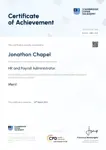
Pathological Demand Avoidance & Autism Training - CPD Approved Training
CPD Accredited | Interactive Learning Materials | Gift: PDF Certificate + 1 Free Course | Tutor Support| Lifetime Access
Cambridge Open Academy
Summary
- Certificate of Completion (PDF) - Free
- Certificate of Completion (Hard Copy) - £9.99
- Exam(s) / assessment(s) is included in price
- Tutor is available to students
Add to basket or enquire
Overview
**2 in 1 Pathological Demand Avoidance & Autism Training - CPD Approved Training bundle**
Pathological Demand Avoidance (PDA) is a profile of autism spectrum disorder (ASD) characterised by an extreme avoidance of everyday demands. PDA is often misunderstood and misdiagnosed, as it can share some similarities with other conditions such as oppositional defiant disorder (ODD) and attention deficit hyperactivity disorder (ADHD). However, PDA is a distinct condition with its own unique characteristics.
This course will provide participants with a comprehensive understanding of PDA, including its definition, characteristics, and causes. Participants will also learn about the latest research on PDA and how to identify and support individuals with PDA.
Learning Outcomes:
- Gain a comprehensive understanding of Pathological Demand Avoidance, exploring its roots and historical context.
- Develop insights into Autism spectrum disorders, delving into their nuances and coexistence with Pathological Demand Avoidance.
- Explore practical strategies for managing Pathological Demand Avoidance in both school settings and within the family unit.
- Understand the intricacies of Sensory Processing Disorder and its impact on individuals with Pathological Demand Avoidance.
- Acquire knowledge about the historical evolution of Pathological Demand Avoidance and its relevance in contemporary contexts.
- Explore the intersection of learning disabilities and Autism, with a focus on the challenges posed by Pathological Demand Avoidance.
- Expand your skill set to effectively navigate and support individuals exhibiting Pathological Demand Avoidance tendencies.
This Pathological Demand Avoidance & Autism Training - CPD Approved Training Bundle Consists of the Following Courses:
- » Course 1: Pathological Demand Avoidance Diploma
- » Course 2: Autism Training
Key Features & Benefits:
- Learn from experts in the field
- Gain a comprehensive understanding of Pathological Demand Avoidance & Autism
- Cost-effective Learning
- Career advancement opportunities
- Find the proper personal balance
How it works:
- The course is delivered online, so you can access it from anywhere.
- It is self-paced, so you can work through it at your own pace.
- Lifetime access makes your learning period more flexible.
- There are quizzes and assignments to test your knowledge.
Certificates
Certificate of Completion (PDF)
Digital certificate - Included
After completing this Pathological Demand Avoidance & Autism Training - CPD Approved Training bundle, you will be eligible for CPD certified certificates from Cambridge Open Academy.
For Pathological Demand Avoidance Diploma, you will get CPD Certification Service (CPD UK)- accredited certificate, and for the other course, you will get CPD Quality Standards (CPD QS) accredited certificate from Cambridge Open Academy.
Certificate of Completion (Hard Copy)
Hard copy certificate - £9.99
Note: Delivery of hardcopy certificate is free within the United Kingdom. However, to obtain a hardcopy certificate, international students have to pay £19.99 for the shipment to their designated address.
CPD
Course media
Description
Embark on a journey of understanding with our CPD-approved Pathological Demand Avoidance & Autism Training. This course, comprised of six modules, is meticulously designed to provide in-depth insights into the multifaceted world of Pathological Demand Avoidance (PDA) and its connection to Autism spectrum disorders. From laying the foundation with an exploration of PDA's historical roots to dissecting the complexities of sensory processing disorders, each module contributes to a holistic understanding of this phenomenon.
Dive into the historical evolution of PDA, unravel its coexistence with Autism, and discover practical strategies for managing PDA in educational and familial settings. This course caters to educators, healthcare professionals, and parents seeking a theoretical grasp of PDA without the need for hands-on experience. Embrace this opportunity to broaden your knowledge base and contribute meaningfully to the lives of those affected by Pathological Demand Avoidance.
Course Curriculum:
- Module 01: Introduction to Pathological Demand Avoidance
- Module 02: Understanding Autism
- Module 03: PDA in Schools and Parent Information
- Module 04: Sensory Processing Disorder
- Module 05: The History of PDA
- Module 06: Learning Disability and Autism
Our Specialised Delivery Method:
- Learn by Doing: Interactive activities keep you engaged.
- Go Mobile: Works on any device, no downloads needed.
- Easy to Use: Simple design for all learners.
- Track Progress: Stay motivated with clear progress tracking.
- Visually Appealing: Enjoyable learning experience.
Enrol today and become a beacon of support and understanding for individuals navigating the challenges of Pathological Demand Avoidance.
Who is this course for?
- Educators seeking a profound understanding of PDA and its implications in school settings.
- Parents aiming to grasp the complexities of PDA for effective home management.
- Individuals interested in theoretical explorations of autism and its historical context.
- Professionals in related fields eager to expand their knowledge of sensory processing disorders.
Requirements
Enrolling in Pathological Demand Avoidance & Autism course is quite simple!
- No prior knowledge needed
- Compatible with any internet-enabled device, including computers, tablets, and smartphones
- Consistent learning experience
- Accessible anywhere, anytime
- No limitations on access
- Use Wi-Fi or mobile data
Career path
- PDA Consultant: £30,000 - £45,000 per year
- Autism Specialist: £25,000 - £40,000 per year
- Educational Support Worker: £18,000 - £25,000 per year
- Disability Services Coordinator: £30,000 - £40,000 per year
- Behaviour Analyst: £25,000 - £40,000 per year
- Special Education Teacher: £25,000 - £35,000 per year
Questions and answers
Currently there are no Q&As for this course. Be the first to ask a question.
Reviews
Currently there are no reviews for this course. Be the first to leave a review.
Legal information
This course is advertised on reed.co.uk by the Course Provider, whose terms and conditions apply. Purchases are made directly from the Course Provider, and as such, content and materials are supplied by the Course Provider directly. Reed is acting as agent and not reseller in relation to this course. Reed's only responsibility is to facilitate your payment for the course. It is your responsibility to review and agree to the Course Provider's terms and conditions and satisfy yourself as to the suitability of the course you intend to purchase. Reed will not have any responsibility for the content of the course and/or associated materials.







